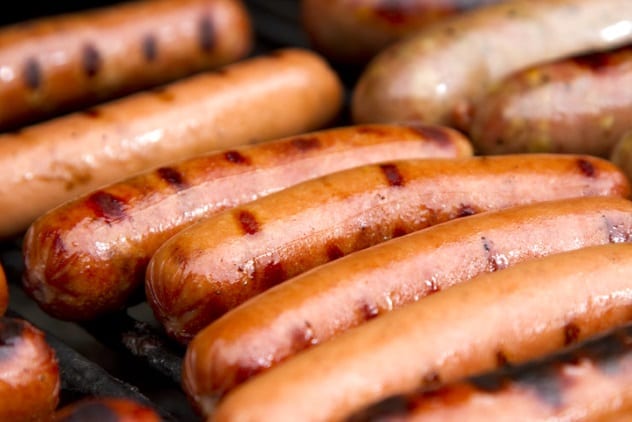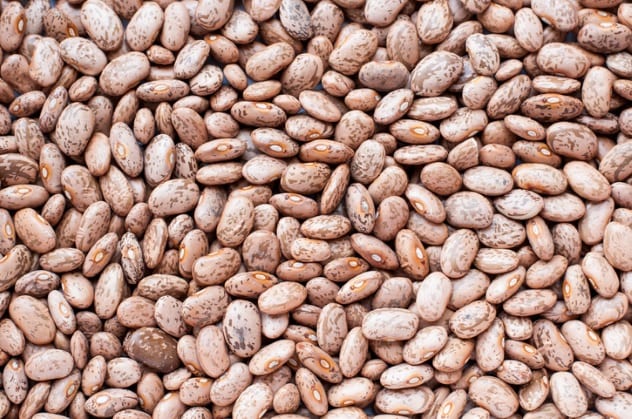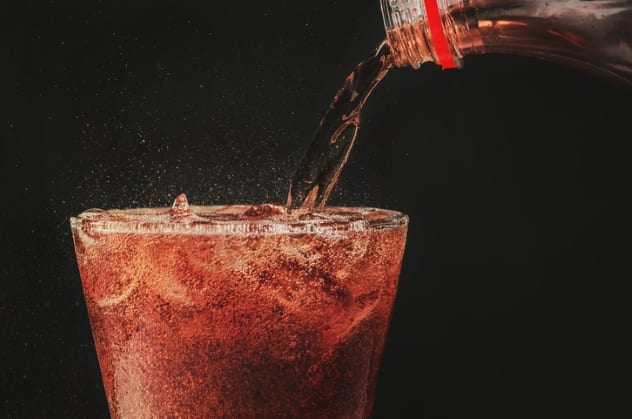While food can have many positive roles, it can also lead to some very disastrous results. From outbreaks to recalls to the development of diseases and allergic reactions, food can play a starring role when it comes to negative side effects.[1] Many times, these side effects are known and can be prevented, but other times . . . not so much. Here are a few instances where food and drink or their production played a very unfortunate role in people’s deaths.
10 Game Gone Wrong
Hot dog-eating contests are not an unfamiliar competitive event; in fact, many eating competitions featuring a variety of foods have gained popularity around the world. However, despite the popularity of these contests, there are many risks that come along with competitive eating competitions, one of which is the choking hazard. Such a problem happened for 13-year-old Noah Akers from San Pedro, who choked in a hot dog during a game and ultimately died. Noah Akers had been one of many participating in a hot dog-eating game in 2010, hosted by the Boys and Girl’s club in order to raise relief funds for the earthquake in Haiti. While the club claims it was not an eating contest in the normal sense, as the children where only asked to eat one hot dog which was covered in whipped cream, it was still an event where a candy prize would be given to whoever managed to finish the strange food combination. Noah had been participating in the event when the hot dog became lodged in his throat. Although bystanders attempted to dislodge the hot dog from his airway, it remained stuck until paramedics arrived. The paramedics were able to dislodge the hot dog, but Noah had gone too long without oxygen and passed away a few days later at the hospital.[2] An investigation was made into the event, though it was determined that the organization had provided proper supervision and warnings.
9 Bean Pile
Many people suffer injuries in the workplace, especially those who are working with heavy machinery or malfunctioning equipment. It is estimated that in 2018 alone, an estimated total of 14 people died a day due to workplace-related mishaps in the United States. Raymond Segura Jr., a 56-year-old man who worked for a bean company in Colorado, unfortunately experienced an accident which resulted in his untimely death in 2012.[3] Mr. Segura had worked for the Kelley Bean Company for over 12 years without incident until one day, the overhead conveyor belt he was monitoring malfunctioned. The conveyor belt was used to transport pinto beans in large, bulk quantities, and due to the malfunction, Mr. Segura became trapped under falling beans. When he did not respond to inquiries about his status, workers were sent to investigate and saw the mountain of beans. Once it was realized that Mr. Segura had become trapped under the beans, over 50 emergency personnel as well as inmates from a local jail came to his aid. It took over an hour to dig out Mr. Segura’s body from the 6-meter (20 ft) pile of beans which had fallen on top of him. Unfortunately, by the time they reached him, Mr. Segura had already passed away, though it was unknown if it was due to lack of oxygen or the impact. An inquiry was put into place concerning the malfunction of the conveyor belt by both the police and Kelley Bean Company. The incident was ultimately ruled an accident.
8 Drowned In Whiskey
The decision to take one’s life is not an easy one, and with the number of suicides seeing an increase from previous years, any steps that can be taken can help to save a life. In the case of Brian Ettles of Scotland, the 46-year-old father’s suicide on the job in 2012 came as a shock to all around him. Mr. Ettles, who had worked for the Glenfiddich Distillery for 22 years, had just celebrated his wife’s birthday the night before and seemed normal while at work the next day. However, despite his normal appearance and activity, Mr. Ettles climbed 5 meters (16 ft) up to the top of a 50,000-liter (13,000 gal) tank in which whiskey was distilled and threw himself inside.[4] Alarms were raised shortly afterward, and paramedics were called in to aid Mr. Ettles. By the time the emergency crew were able to reach him, he was unresponsive and was pronounced dead on the scene. After an investigation, no signs of suspicious circumstances or foul play were suspected in Mr. Ettles death. It was concluded that he had, unfortunately, taken his own life, though police did not find a suicide note. The coroner determined that his cause of death had been drowning in the vat.
7 Carroted Out
Maintaining a healthy lifestyle is important if one wants to keep in tip-top shape and feeling the best they can. Over time, many diet fads have come and gone, all of which claimed to be the best option for maintaining perfect health. Basil Brown, a health fanatic, was known for his interest in attempting to find this level of perfection. The 48-year-old had gone through various different avenues in trying to chase this ultimate health goal. In 1974, during a stint in which he began to drink an estimated 3.8 liters (1 gal) of carrot juice daily, Mr. Brown was advised by his doctor that his new health regimen was going to have detrimental effects, such as irreversible damage to his liver. Despite the warning, Mr. Brown kept up his new diet over a period of ten days, drinking over 10,000 times the recommended daily intake of vitamin A. True to his doctor’s word, Mr. Brown experienced cirrhosis of the liver, which ultimately killed him. After being autopsied, it was ruled that his overingestion of vitamin A caused toxicity and prompted liver failure.[5] Mr. Brown also experienced a yellow-orange hue to his skin due to the large amounts of carotene in his system from the carrot juice.
6 Baked In
Performing maintenance work can come with risks, especially when dealing with large, heavy machinery. Being aware of these risks and taking precautions is essential. In 1998, David Mayes and Ian Erickson both believed that the necessary precautions had been taken when they were called in to perform maintenance on a bread-baking oven in the Harvestime Bakieries plant in Leicester. The oven, which was 23 meters (75 ft) long, had not been shut off long enough, however. Instead being deactivated for a full 12 hours before maintenance, the oven had only been shut off for two. Mayes, 47, and Erickson, 43, entered the oven, only to call through their walkie-talkies moments later that it was too hot inside. Due to there not being an option to reverse the conveyor belt, the men were forced to go through. The temperature in the middle was estimated to still be 100 degrees Celsius (212 °F). It took 17 minutes for the conveyor belt to bring Mr. Erickson out, but Mr. Mayes became trapped in the oven.[6] Due to the extent of his burns, Mr. Erikson died in front of his coworkers, and paramedics recovered Mr. Mayes’s body after arriving on the scene. Due to the circumstances of their deaths, a lawsuit was filed, and it was revealed that the management at Harvestime had declined having repairmen come due to the cost and the length of time it would take to repair the oven. Instead, they asked members of their own staff to do so, choosing to have them go in while the oven was still warm so that they didn’t have to wait long for it to reheat and could continue production. Three executives and the owners of Harvestime all admitted to health and safety offenses and were fined £373,000.
5 Mixed In Dough
Baking at a manufacturing level calls for larger machines, some of which can be dangerous to be around if one is not careful, as illustrated in the previous entry. For Mr. Ng Sew Kuang, the 73-year-old owner of Seng Confectionery in Singapore, what seemed to be a routine procedure ended up being one that cost him his life. In 2018, Mr. Ng was in the middle of making red bean paste for his confections when he apparently fell into a dough-making machine. The mixer had, unfortunately, been on, and due to the force of the machine, Mr. Ng was crushed to death due inside his mixture. His body was found by his workers, who noticed there was an odd burning smell coming from upstairs.[7] By the time emergency personnel arrived, however, it was too late, and Mr. Ng had passed away. Mr. Ng had been working on the second floor since 4:00 AM, as he did every day, making it uncertain when he fell into the mixer exactly, and his death was ruled an unfortunate accident. The bakery, which was next to his daughter’s salon, had been featured in The Straits Times for its traditional creations and baked goods only four years prior.
4 Death By Chocolate
While the name “Death by Chocolate” is most commonly used to describe different types of chocolate dishes or as an expression that can sometimes be thrown around when someone has too much chocolate to eat, for Mr. Vincent Smith Jr., it was a literal description of his untimely death.[8] In 2009, Mr. Smith, 29, had recently been hired at Lyons and Sons in Camden, New Jersey, which processes and mixes chocolates. He was standing on top of a platform over a vat of melting chocolate. Mr. Smith had been in charge of adding chocolate into the vat when he apparently slipped and fell in. One of his coworkers saw him fall and ran to the shut-off valve, but Mr. Smith had been hit by one of the paddles inside the vat, which keeps the chocolate moving. By the time his coworkers got him out of the vat, it was too late, and Mr. Smith was pronounced dead due to being hit by the paddle and pulled under the hot, melting chocolate. While the fall was ruled accidental by police, it was discovered that the company had been working without the proper permits. Lyons and Sons was then investigated by the Occupational Safety and Health Administration over their safety precautions, and the family filed a wrongful death suit.
3 Cooked With Tuna
In the workplace, communication is important, especially when workers may not be aware of each other’s location or progress. In the case of Mr. Jose Melena, who had been repairing the inside of an industrial oven used for the tuna at the Bumble Bee plant in California where he had worked for six years, no one had informed others of his presence inside the oven, leading to his coworker turning it on while he was still inside. In 2012, 62-year-old Mr. Melena had been assigned to fix some of the chains inside the 11-meter-long (35 ft) oven and was inside when one of his coworkers turned on the oven and then proceeded to dump around 6 tons of tuna inside. Mr. Melena had no means of escape and was cooked inside the 132-degree-Celsius (270 °F) oven along with the tuna for two hours. His coworkers discovered his charred body after they realized his car was still in the parking lot, and he was declared dead by firefighters who arrived on the scene.[9] After looking into Mr. Melena’s death, it was found that Bumble Bee hadn’t been reporting their worker injuries, including a severed finger and a fractured skull which had occurred due to safety violations. The company, the plant’s director of operations, and the safety manager were each charged with three felony counts of safety violations causing death. Bumble Bee had to pay over $6 million in damages.
2 Water Intoxication
Drinking the recommended amount of water daily is good for one’s health and skin. However, it is also important to know that drinking too much water can also lead to serious health issues. A mother in California was unaware of the serious consequences which can stem from too much water intake and died after her participation in a radio station’s water-drinking contest in 2007. Jennifer Strange, 28, had participated in KDND-FM’s contest “Hold Your Wee for a Wii,” in which whoever drank the most water would win a Nintendo Wii. She told other contestants she was doing it for her three kids at home. The competition called for the participants to drink as many water bottles as they could without going to the bathroom. Halfway through the contest, the radio hosts upped the amount of water that needed to be drank. While some listeners, one being a nurse, called in to warm the radio hosts of the risks of their contest, the concerns were waved off by the hosts, who claimed that that all the contestants had signed releases and proceeded to make jokes about the body being made of mostly water, meaning the contestants would be fine.[10] Mrs. Strange was not fine. She quit at second place due to not feeling well, telling one of the radio hosts that she was in pain. Mrs. Strange is said to have drank around 7.6 liters (2 gal) of water in three hours, causing her to become bloated to the point that one of the radio hosts mentioned she looked pregnant. After calling sick into work, Mrs. Strange went home and was found dead in her bathroom just hours after her participation in the contest. The cause of her death was determined to be water intoxication. Her husband sued the radio station. It was discovered that the contest was not approved or even sent to the station’s legal department for review and that no warning was provided to the contestants over the risks involved in the contest itself, though contestants were told to quit if they felt ill. The jury sided with Mr. Strange, finding that Entercom Sacramento LLC was liable for Mrs. Strange’s death and owed the family $16.5 million. Ten radio station employees were fired after the event, three of whom were the hosts from the morning’s competition.
1 Over-Caffeinated
In 2010, a New Zealand mother’s constant consumption of Coca-Cola resulted in sudden cardiac arrest, which killed her. Natasha Harris, 30 years old, was known for her love of the soda, consuming a large amount every day from the time she woke up to before she went to sleep. Her husband estimated that his wife’s intake totaled around 10 liters (2.6 gal) of Coca-Cola daily. The amount of cola she drank contained 11 times the recommended amount of sugar one should be having daily and twice the amount of caffeine that can be safely ingested. Mrs. Harris had been suffering from nausea, fatigue, and various symptoms the week before her death, though both she and her family believed it was due to her being stressed. Mrs. Harris’s addiction to Coca-Cola was not only a severe problem for her, as she experienced withdrawal symptoms when she was not able to have access to the beverage and had previously undergone dental surgery to have teeth removed due to her soda intake, but to her children as well. At least one of her eight kids was born without tooth enamel, a condition attributed to her Coke-drinking.[11] While Coca-Cola was determined not to be responsible for Mrs. Harris’s death, many called for the company to put better warning labels on their products.
























